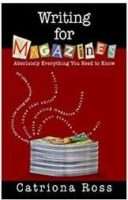As a freelance writer, you need to keep coming up with fresh, compelling ideas for features. One of the brilliant benefits of this job is the freedom to write exactly what you want to. Make the most of it! The question to ask yourself is this: What do I want to write?
Find out which stories interest you. As a first step, buy a few newspapers and magazines you like, and go through them. Cut out articles and news snippets you find interesting, plus any articles that make you think, ‘I wish I’d written that’. Are you intrigued by a new study that shows eldest children’s IQ scores to be a few points higher than those of their siblings? Or, say, by the fact that certain celebrities are power yoga devotees? Cut these articles out and file them. Keep this practice up as long as you’re a writer. Go through the newspaper and a magazine or two every week, and you’ll start seeing themes in the stories that speak to you. As your stack grows, file them in sections: use file dividers, marked (for example) ‘celebrities’, ‘technology’, ‘alternative healing’, ‘nutrition’, ‘politics’, ‘nature’, ‘trends’, ‘family life’.
Mine your personal experiences. Especially when starting out as a freelance writer, it’s handy to draw on your stock of personal stories, as these articles don’t require much research. Which aspects of your life would you like to write about? What unusual experiences have you had? Brainstorm ideas and you should come up with a few usable concepts. Maybe you learnt to ride a bicycle at age 21, and want to share the agony and ecstasy of taking your first cycling holiday. Or you’ve been a poker pro since the age of nine, and can write a handful of articles on the subject, from how-to pieces to humour. Or you’d like to tell others how you finally kicked your sugar addiction, and how your new my-body-is-a-temple attitude has boosted your well-being.
Get onto the mailing lists of publicity companies. Public relations companies exist to promote the people, products, events, businesses and organisations on their books. If there’s even a slim chance that you, a writer, might be able to offer them editorial coverage, they’ll happily bombard you with informative press releases, invitations to swanky launches of new restaurants and galleries, contact details of interesting people, and hot tip-offs.
Join a press club or freelance writers’ association. Membership may allow you to attend talks, press conferences, launches and monthly meetings; share ideas and issues with other journalists in online chatrooms; find writer friends and mentors; stay up to date with industry news; get advice on tax and recommended rates of pay; and find story leads. Some associations offer members a media card, which not only gives you credibility as a freelance writer but is a passport to newsworthy events. Contact the Southern African Freelancers Association (SAFREA): www.safrea.co.za
Offer to tell people’s stories. Everyone has a story, from the interesting to the gasp-worthy. When friends, family or strangers share the tale of, say, their amazingly amicable divorce, or the revelation that hit them while being robbed by two young gangsters, or their recovery from an eating disorder, or how they successfully negotiated a raise at work, gently ask whether they’d like to share their story with others in the form of a feature article. Offer to interview them at a convenient time. Consider rounding out the story by adding expert comment and possibly a couple of other case studies to highlight aspects of the theme. Then pitch your article idea to a magazine. Simple.
Trawl the press weekly (or daily) for fresh angles. Looking for news snippets is an easy way of coming up with story ideas. A story idea isn’t just a topic; it must be a topic with an angle. Every story you write needs an angle – a specific take on a particular subject – and that angle must be new and interesting. For example, the differences between the way men and women think has been written about to death. However, new research that suggests men’s pheromones bridge the gap between the left and right hemispheres of their brains during the in-love stage of a relationship, turning him into a warmed-over woman, can make a compelling angle.
Always ask yourself, ‘Has this been done before?’, ‘Have I read a similar piece somewhere?’ If the answer’s yes, you need to dig deeper to find your angle. Ask, ‘What don’t people know about this?’ and ‘Which specific aspect of this subject is unusual and interesting?’ You may just need to look for an update or new application of the subject.
Look for:
Trends. What’s everyone suddenly talking about? Which new word, concept, theory or fad have you heard three times in conversation this past week?
New organisations and new appointments.
Unusual new businesses.


